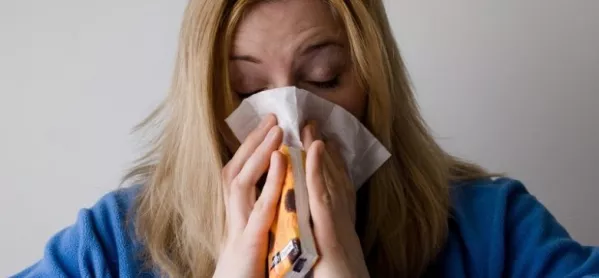Teachers have impressive immune systems.
When I used to teach in a germ-filled shool in London, and was a regular on the Tube, surrounded by coughs and sneezes, my friends living beyond the M25 would joke that I would stand a good chance of surviving biological warfare.
Schools are breeding grounds for germs, but where are you most at risk?
Teacher wellbeing: shaking hands
The worst events are those where you have to shake hands with lots of people, such as parents’ evening. On average we carry 3,200 bacteria from 150 different species on our hands - why do you think the Queen is a committed glove-wearer?
Quick read: Teacher hacks: how to defrost your car quickly
Quick listen: The truth about mental health in schools
Want to know more? How I learned to live with my shyness
To avoid getting a handful of germs, you could take a leaf out of HRH’s book or, alternatively, keep some hand sanitiser close by and wash your hands thoroughly. For handwashing to be effective, you should use mild soap and warm water and you should take a minimum of 20 seconds (or sing Happy Birthday to yourself twice, preferably in your head).
Or try fist bumps; more hygienic, but perhaps not as professional.
Up close and personal
The American Centres for Disease Control and Prevention (CDC) advises that flu can be transmitted between people who are up to 6ft away from each other. It is believed that flu viruses are spread by droplets landing in the mouths or noses of nearby innocents when the contaminated cough, sneeze or talk. Nice.
Alas, it’s impractical to employ an exclusion zone when teaching. You could cover your nose and mouth, but Michael Jackson really did that look no favours. Instead, try keeping your room well-ventilated and carefully consider who you lend your favourite pen to.
Crowded rooms
When people are gathered together en masse, so are all their viruses and bacteria. Unfortunately, there is no getting out of assembly or canteen duty, so arming yourself against winter illnesses is your best strategy.
Ensuring you eat a healthy and varied diet is a given - blueberries are rich in vitamin C, as well as the powerful antioxidant anthocyanin. Kiwi fruits, on average, contain 137.2 mg of vitamin C, compared with 69.7mg in the average medium-sized orange.
A teacher friend of mine swears by oregano oil. It’s recognised as an active antimicrobial and effective antioxidant, which support the immune system and help fight off any pesky bugs.
Stressful times
Ofsted, piles of mock exam marking, Year 8 period five on a Friday; there are lots of potential stressors when working in a school. When you are stressed your immune system is compromised, particularly if you are not sleeping well.
It might be tempting to reach for the gin and/or biscuits, but alcohol can impact the amount of restorative sleep you get, and too much sugar can upset the balance of intestinal flora in your gut, which play an essential role in strengthening your immune system.
You can increase the amount of good bacteria in your gut by taking an acidophilus supplement (the higher the number of friendly-bacteria, the more effective) or by including yoghurt, kefir or fermented foods, such as kimchi, in your diet.
Gemma Corby is a freelance writer and former special educational needs and disability coordinator




